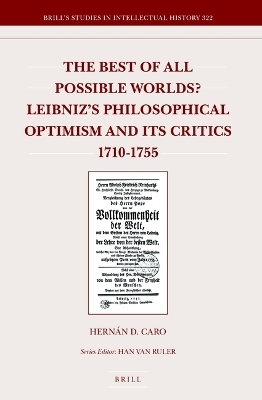
The Best of All Possible Worlds? Leibniz's Philosophical Optimism and Its Critics 1710-1755
Brill (Verlag)
978-90-04-21846-8 (ISBN)
The reign of philosophical optimism, or the doctrine of the ‘best of all possible worlds’ in modern European philosophy began in 1710 with the publication of Leibniz’s Theodicy, about God’s goodness and wisdom, divine and human freedom, and the meaning of evil. It ended on November 1, 1755 with the Lisbon Earthquake, which was followed by numerous attacks against optimism, starting with Voltaire’s Poème sur le désastre de Lisbonne and Candide. The years between both events were intense. In this book, Hernán D. Caro offers the first comprehensive survey of the criticisms of optimism before the infamous earthquake, a time when the foundations of what has been called the ‘debacle of the perfect world’ were first laid.
Hernán D. Caro, Ph.D. (2012, Humboldt-Universität of Berlin).
Acknowledgments
Introduction
1 The Theodicy and Leibniz’s Philosophical Optimism
1 Philosophical Optimism: The System of the Best and the Meaning of Evil
2 The Foundations of Philosophical Optimism
3 The Problem of Freedom and Leibniz’s Theory of Hypothetical Necessity
2 Eternal Truths, the Choice of the Best, and the Almighty Reality of Sin: Budde and Knoerr’s Doctrinae orthodoxae de origine mali (1712)
1 Two Conceptual Hazards: Metaphysical Evil and Uncreated Eternal Truths
2 “God Did not Identify Several Worlds, but Immediately the Best”: Against the Divine Choice of the Best
3 Not a Wonderful World – The Best of All Possible Worlds after Sin
4 Final Comments and Open Questions
3 A Jesuit Attacks: Louis-Bertrand Castel’s Review of the Theodicy in the Journal de Trévoux (1737)
1 The Happy Rationalist
2 God’s Freedom and Evil in the Best of All Worlds: Some New Names for Usual Criticisms of Optimism
3 Final Comments and Open Questions
4 Banning the Best World, God’s (Supposed) Freedom, and the Principle of Sufficient Reason: Christian August Crusius’s Criticism of Optimism (1745)
1 Conceptual Flaws and the Moral Danger of Optimism
2 On the Use and Limits of the Principle of Sufficient Reason
3 Final Comments and Open Questions
5 The Prize-Contest on Optimism of the Prussian Academy of Sciences: Adolf Friedrich Reinhard’s Examen de l’optimisme (1755)
1 Reinhard’s Picture of Optimism
2 Against Optimism
3 Final Comments and Open Questions
6 Early Counter-Optimism: Main Arguments and the Nature of the Conflict
1 Counter-Optimism: An Inventory of Arguments
2 Classifying Counter-Optimism: The Intellectualism-Voluntarism Schema
3 Some Comments on the Feasibility of Intellectualism and Voluntarism
Conclusions
Bibliography
Index
| Erscheinungsdatum | 25.09.2020 |
|---|---|
| Reihe/Serie | Brill's Studies in Intellectual History ; 322 |
| Verlagsort | Leiden |
| Sprache | englisch |
| Maße | 155 x 235 mm |
| Gewicht | 475 g |
| Themenwelt | Geisteswissenschaften ► Philosophie ► Ethik |
| Geisteswissenschaften ► Philosophie ► Geschichte der Philosophie | |
| Geisteswissenschaften ► Philosophie ► Philosophie der Neuzeit | |
| Sozialwissenschaften | |
| ISBN-10 | 90-04-21846-7 / 9004218467 |
| ISBN-13 | 978-90-04-21846-8 / 9789004218468 |
| Zustand | Neuware |
| Haben Sie eine Frage zum Produkt? |
aus dem Bereich


